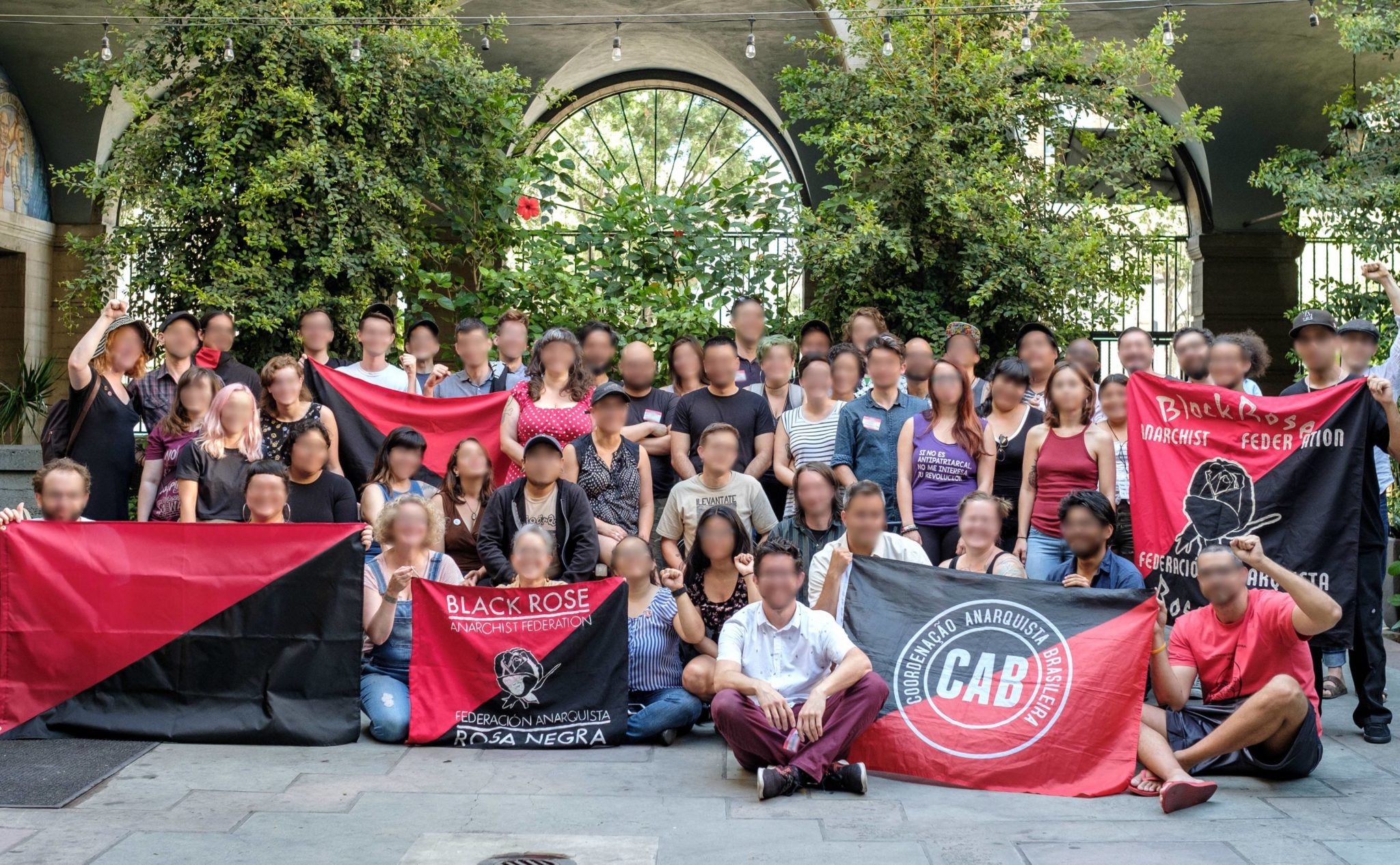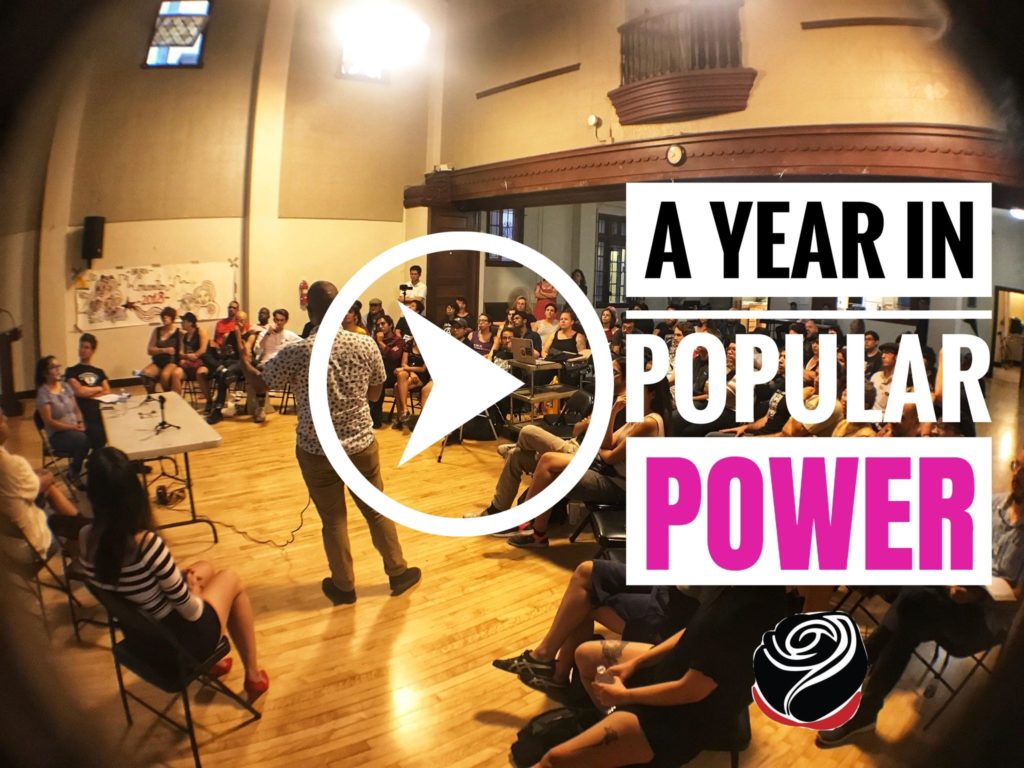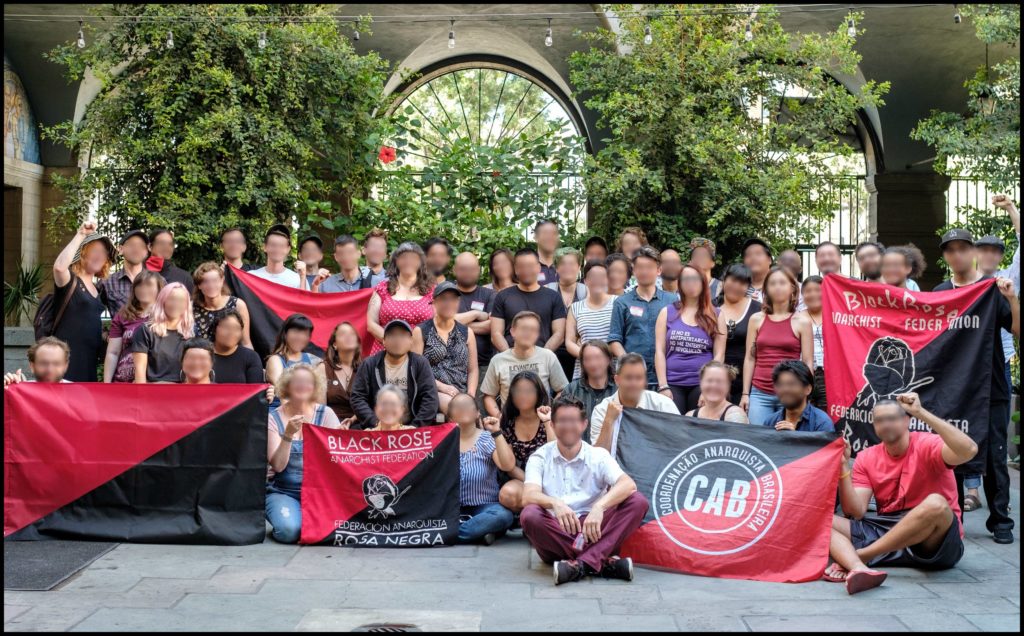
Report on the 5th Black Rose/Rosa Negra National Convention, Los Angeles
By Alex Isa and Tanya H.F. with contributions from Agüey Baná and Adam Weaver
Note: This version has been updated since the original posting.
Amidst heated discussions, mostly due to warm California weather and packed rooms full of enthusiastic militants, 60 members of Black Rose/Rosa Negra Anarchist Federation (BRRN) met August 3-5 in Koreatown, Los Angeles for the organization’s 5th National Convention. The weekend included three days of discussion and strategy sessions aimed at strengthening the organization and focusing on our goals at a time of rapidly evolving mass struggles and passionate debates about the direction of revolutionary politics in the Americas.
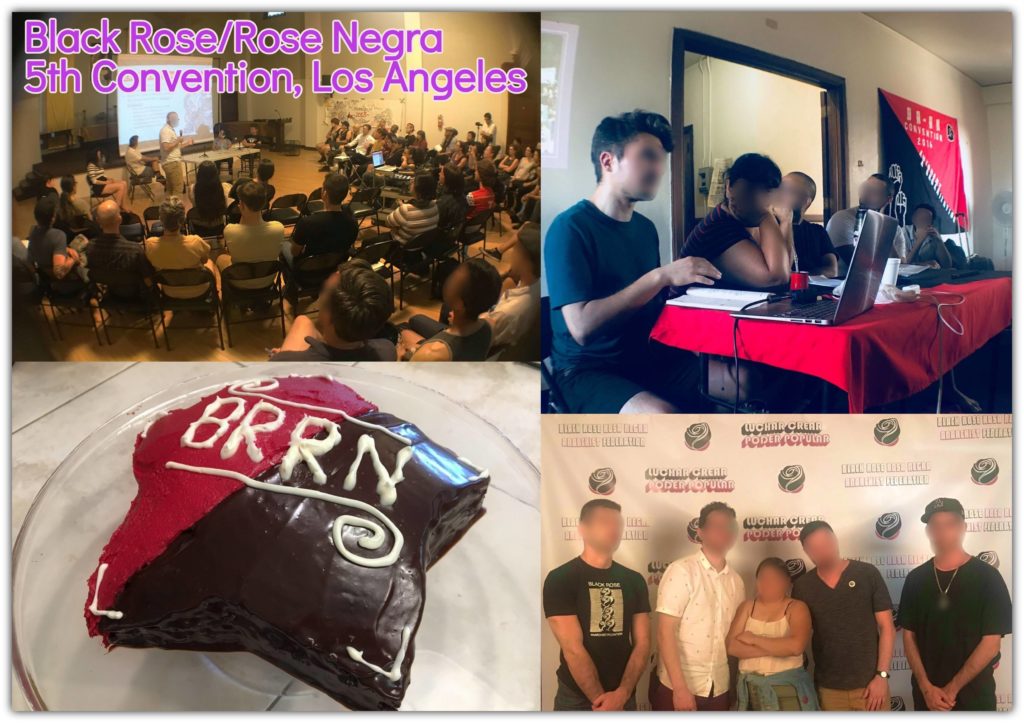
The Struggle Continues
At last year’s Convention in 2017, members received the news about events at Charlottesville – the death of Heather Heyer and the many activists injured by white supremacists. In stark terms, 2017 represented the continuation of repressive and reactionary policies at various levels with the legal harassment of J20 protesters, the detainment of migrant children, further attacks on organized labor, and the political challenge represented by growth of left electoralism and sectors of the left seeking institutional power. This marked the context in which BRRN members have been building a broader analysis of political events while also working to build popular power where we live, where we work, and where we study.
One of the strongest messages at the Convention were the examples of involvement in dynamic organizing work despite often difficult circumstances. The Friday night panel presentation event, “A Year in Popular Power,” featured four BRRN members discussing their organizing work over the past year and will soon be released as a four part Youtube series.
Enrique in North Carolina presented on organizing with fellow public school teachers in a one day strike as part of the larger #RedForEd movement. Markie, based in Los Angeles, shared their experiences organizing a Rapid Response Network through Koreatown Popular Assembly, an initiative to quickly mobilize community members in Koreatown – many of whom are undocumented – against ICE raids and incursions into their neighborhoods. In Central Illinois, Tariq described their experiences organizing University of Illinois graduate students – a highly exploited but part of a rapidly growing and increasingly militant sector of labor – while resisting the siren song of opportunistic politicians. Stephan, based in Portland, described the formation of a grassroots fast food workers’ union aligned with the IWW (the Burgerville Workers Union). Despite being one of several campaign leaders fired during the the campaign, they described how during a time when glossy labor initiatives such as Fight for $15 have been relatively unsuccessful in winning concessions from fast food behemoths, the union landed a series of important victories to become the first recognized fast food union in the US.
This range of projects, representing different communities and locations, joining in a common struggle against exploitation and oppression, shows the importance of specific anarchist organization as a powerful tool for work within larger social movements and reflecting both a theory and practice of our shared libertarian socialist ideals. The panel also highlighted the growing internal diversity of BRRN as an organization.
Expansion and Diversification
At a time when sectors of the left have much work to do representing and centering the communities implicated in political and social struggle, one of the bright spots of the Convention was that it highlighted an increasingly diverse membership both in terms of race and gender. One member from the Bay Area estimated that attendees consisted of 50% women and over 50% people of color. This isn’t a matter of optics for us. When we talk about building popular power, we don’t mean a project where cisgender white males dictate the terms of revolutionary transformation, asking sex workers, incarcerated folks, queer and transgender comrades, undocumented comrades, people of color, and working class comrades to wait patiently for the next election, the next podcast, or the next journal publication for their demands to be represented. What we envision is an organization of committed militants representing oppressed communities and fighting by their side.
The growing diversity of BRRN could also be felt geographically. Since the organization’s 2017 Convention new locals have formed in Seattle, Albuquerque, and the Bay Area, while nearly all locals experienced membership growth.
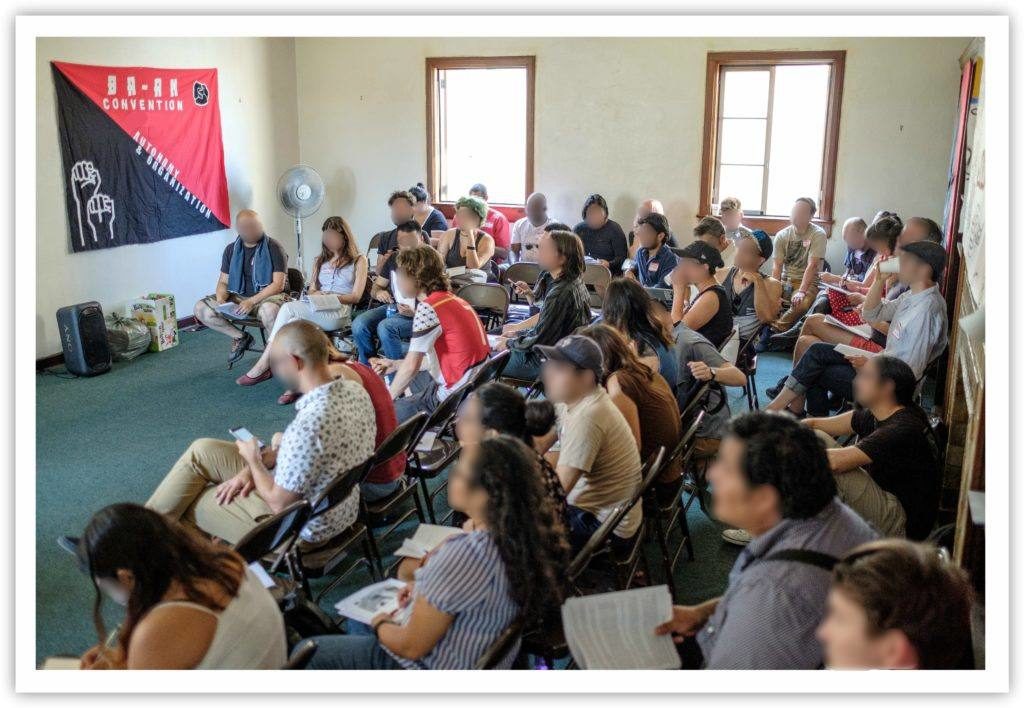
Towards an Americas Coordinator
BRRN was extremely excited to arrange for and welcome several comrades from sister organizations in Latin America as observers to the Convention. Their presence signaled our strengthened ongoing personal and organizational ties between those of us struggling in the belly of the beast of the US empire and the global south of Latin America. International comrades present at the Convention represented Solidaridad (Chile), Movimiento político Socialismo y Libertad – SOL (Chile), Acción Socialista Libertaria – ASL (Argentina), and the Coordenação Anarquista Brasileira – CAB (Brazil). As members of anarchist and political organizations in countries with rich traditions of mass revolutionary struggle, they contributed their insight to our discussions.
Far from being observers, our international comrades also contributed to a discussion and proposal to establish the creation of an ‘Americas Coordinator,’ which would act as a coordinating body for similar revolutionary groups in northern and southern America. The defined purpose would be “to formalize political relationships with organizations across the Americas that share similar political programs, social insertion work, analysis, and outlook.” Concretely the purpose would be to organize exchanges among militants, develop shared political analysis and perhaps even stimulate the formation of new political organizations. Convention delegates overwhelmingly expressed their support for this project before hearing more from a panel of the international attendees on their local struggles. During the Convention, members of BRRN recorded messages of support for ongoing struggles against the criminalization of abortion in Argentina and Chile as an expression of solidarity.
Following the Convention, members of BRRN’s International Relations Committee held a day long meeting with the international comrades from Solidaridad, ASL and CAB to exchange analysis and discuss the creation of an anarchist coordinating body across the Americas. Members from each organization discussed the political climate of each respective country, setbacks and internal struggles within the organizations, as well as political struggles members had been active participants in. At the end of the meeting, some of the organizations agreed to create a proposal producing a shared analysis to build the Americas Coordinator with the purpose of understanding the social, political and economic systems and structures each country faces and which we seek to dismantle. After the shared analysis is created, the Coordinator will discuss how we can move forward.
Developing a Shared Strategic Framework
Much of the work done by Convention attendees over the weekend consisted of reviewing and revising the goals and objectives divided along various “sectors” of social movement work such as labor organizing, territorial or neighborhood/community based organizing, education struggles, anti-criminalization work against the prisons and police, and analysis based committees such as the Radical Ecology Committee. A large portion of the first day was devoted to breakout sessions where members were able to share specific experiences and ideas related to these sectors – an energizing experience that brings members together to build common analysis and to build a sense of the big picture and work against the tendency of being “siloed” in local struggles and campaigns.
Important documents that emerged from discussions leading up to the Convention include a follow up piece to “Below and Beyond Trump: Power and Counterpower” that would present a revised analysis of the current political terrain (known as conjunctural analysis or análisis de coyuntura) and with greater emphasis on a detailing a strategic framework around building popular power. The working title to this is, “Popular Power in a Time of Reaction.”
Another important organizational document that was approved, after over a year of discussion, clarifies expectations of BRRN members and the character, or profile, of the organization and it’s members or “militants.” Each member of BRRN goes through an integration process of 3-6 months consisting of meeting with active members and reading a wide range of materials reflecting on anarchist theory and practice. The new document affirms that BRRN members should continuously strive to meet a certain standard when it comes to their social movement work. In other words, we must do more than attend meetings and dabble in theory.
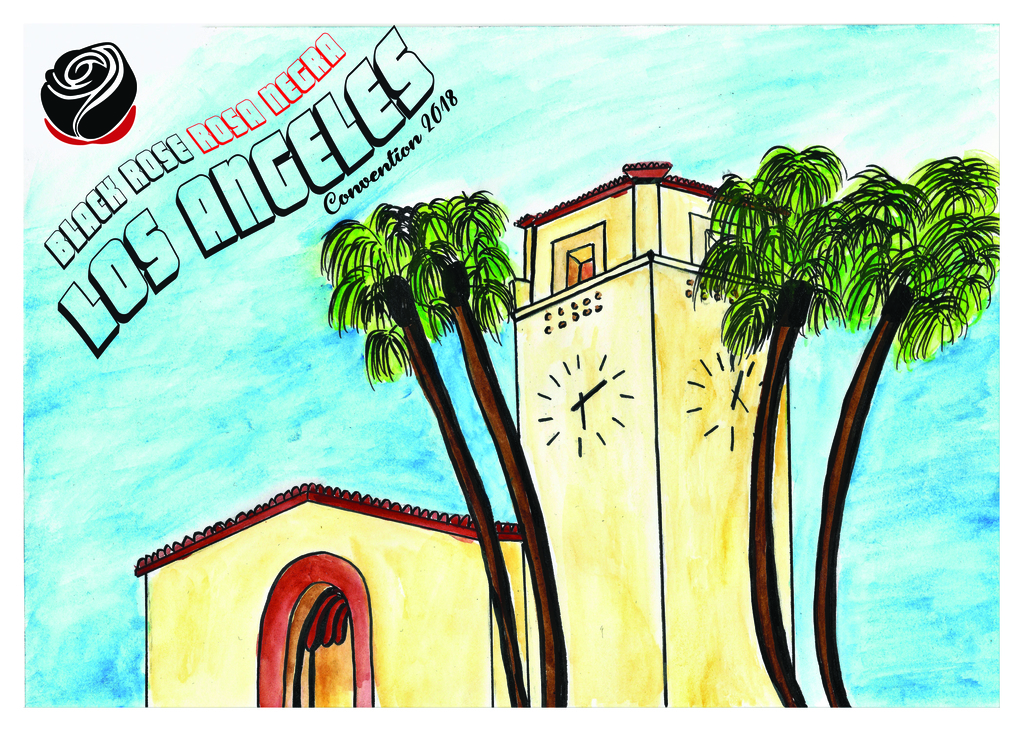 Conclusion
Conclusion
After three days of discussion, panels, breakouts, debates and votes the Convention concluded with the singing of the classic anarchist Spanish Civil War anthem, “A las Barricadas.” Overall the Convention left attendees inspired that the organization has continued to grow and mature in its level of political discussion and in developing a shared sense of continuity and purpose. For new members Conventions are always important opportunities to connect with the larger organization through meeting members from other locals to participating in wider discussions and plugging into national level committee work. This year, as before, we are reminded of the important role of political organization in providing a common vehicle in building a new world, one where, “power and participation flow from the bottom upwards and society is organized for peoples’ aspirations, passions, and needs rather than profit, white supremacy, and racial domination, patriarchy, or imperialism; and where we live sustainably with the planet.”
![]()
![]()
For more on our organization and politics, here’s some recommend readings:
- Strengthening Our Politics, Commitment and Growth: BRRN 4th National Convention
- Below and Beyond Trump: Power and Counter-Power
- Especifismo: The Anarchist Praxis of Building Popular Movements and Revolutionary Organization
- Our Politics: Mission Statement and Points of Unity
Teaser Video for “A Year in Popular Power” a YouTube series based on the panel discussion mentioned above:

